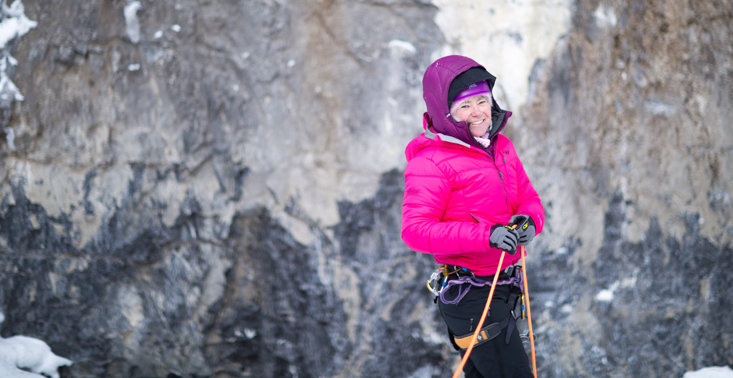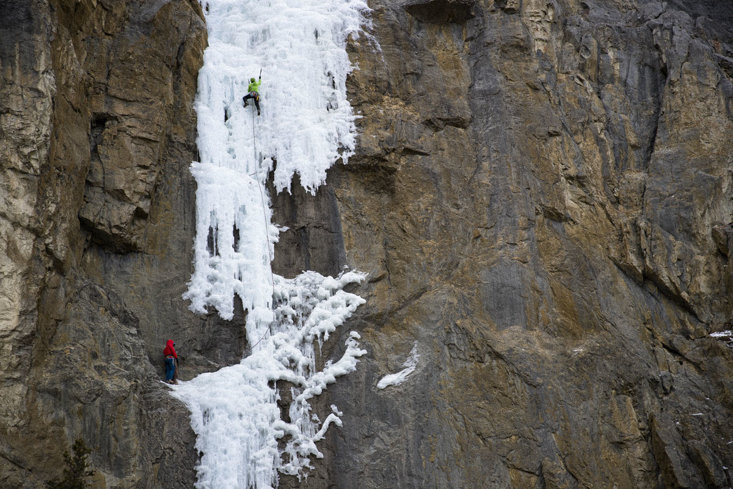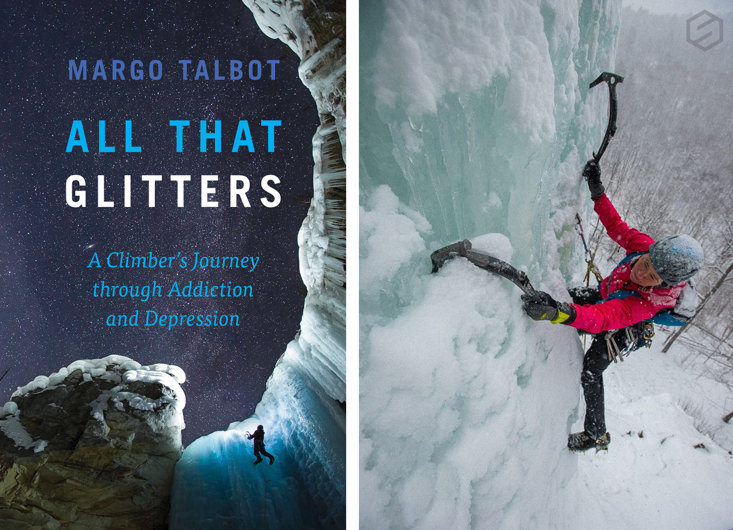At just 12 years old, Margo Talbot was using drugs and drink to help medicate her juvenile depression. As she grew and gained more freedom, she moved on to larger doses and harder drugs, and by the age of 28, she was in a jail cell for 24 hours due to drug offences. Then, thanks to her then-boyfriend, she found ice-climbing. It is no exaggeration to say it has saved her life and, in turn, her experiences have saved others. The Sportsman spoke to the inspirational climber who, now in her mid-fifties, is still climbing.
When did you find your passion for ice climbing?
Twenty-eight years ago, at the age of 28, my then boyfriend took me out on my very first ice climb and it was love at first swing. Up until that day, I had never felt joy without the use of a heavy dose of street drugs. As I swung my first tool into the ice, the entire world fell away, and all that existed was me and the medium. For the entire climb, the pain that I always carried around with me disappeared, and I knew I was going to trade my life of drugs for a life of climbing, I just didn’t know exactly how yet. Ecstasy is defined as “standing outside oneself”. The first time I climbed ice, I knew I had found my passion.
Growing up, you struggled with addiction, could you describe what that time in your life was like?
I used drugs and alcohol from the age of 12 to self-medicate for what I now know was juvenile depression. I define depression as being weighed down by the pain of the past, and at 12 I already had too much pain to cope with life. When I hit puberty, and got the freedoms that came with that, I ran toward substances like my life depended on it. As I got older, I relied on a larger volume of substances, as well as harder and harder drugs.

Could you tell us about your time in jail? Why were you in there?
I got thrown in jail two weeks after I was introduced to ice climbing, on drug charges. The experience only served to put a fire under me to get drugs out of my life. Initially, I felt betrayed by the world, like there was some sort of conspiracy against me and my life. But once I had time to reflect on things, I realised it had taken many years and thousands of decisions to arrive at that place. Once I was released on bail, I vowed I would refashion my life as a climber, and leave behind everything that had landed me in that cell.
What role did ice climbing play in your recovery?
Ice climbing played a crucial role. While it would take me two full years to completely get off drugs, I immediately started figuring out ways to make climbing a larger and larger piece of my life, and drugs a smaller and smaller one. It was this period in my life that made me realise we are literally the sum total of the choices we make, for better or for worse.
How does ice climbing make you feel?
As soon as I leave the ground, I become fully immersed in the experience and everything falls away. Another way to describe it is that ice climbing is so physically demanding, and has enough inherent risk, it brings me completely into the present moment, where I feel connected to nothing but sheer existence. That, for me, is where I find ecstasy.
Is ice climbing a metaphor for life?
We are all on a journey of climbing the mountains of our lives, of our hearts. We do it by learning from the lives and mistakes of others, by acquiring the best equipment for the journey, by training our bodies and minds for the task, and by finding the courage to face the fear of the unknown. And just like life, in climbing we find out who we are, and what we are capable of when we put our minds to it.
What is your greatest accomplishment or moment in ice climbing since you took it up?
When I started climbing ice, I swore I would never lead vertical chandeliered ice, which is the definition of grade six. But sure enough, years went by, I got stronger both mentally and physically, and there I was, leading the very ice I thought I would never have the tools to lead.

What is the feeling like when you reach the top?
While I’m climbing the ice, I think about nothing else. Once I reach the top and clip into the anchor, I can bring my focus back out to the world around me, to the mountain scenery, to setting up the rope for my partner below, and for a feeling of satisfaction at having scaled one more frozen waterfall.
How did you become a mental fitness coach, and do you enjoy it?
Once I wrote my book, I had people writing to me to find out how I brought myself from the brink of suicidal depression to living the life of my dreams. I set up a coaching practice based on my lived experiences, but also on decades of studying every book and video about trauma and brain elasticity I could get my hands on. I also went to a spiritual meditation school and learned how to do energy work. The mental health field has come a long way, but I truly believe that in order to help someone heal from something you have to have skin in the game, you have to have experienced those states yourself, or be so incredibly sensitive you can relate to those states.
At what age do you think you will stop climbing?
That is a very good question and one I ask myself every year as I dust off the tools and head out to find my first ice. And the answer is: I don’t know. Probably not until my body, for whatever reason, can’t go.
What is your advice to anyone who is struggling with addiction at this present time?
Know that you are self-medicating for your pain, and that pain is often masked as anger. Go into your pain, with love and support, and learn how to feel it deeply in order to release it. Find your passion, something that gives you joy so that your entire life is not about dealing with the reasons you sought out drugs in the first place. Be gentle on yourself; but be ruthless in your mission to get the substance or activity, and everyone who engages in it, out of your life.
What are you most proud of in your life?
I am most proud of my healing journey, which includes getting off drugs and overcoming depression. I am continuously working on becoming the best version of myself that I possibly can in any given moment. It’s a journey that will last for the rest of my life, and I’m just as curious to see where I go with it as anyone else might be.

How important is mental well-being and do we underestimate it in society?
We tend to think about our mental well-being only once it has been compromised. My message is that it’s important to take conscious care of it before problems arise. I was traumatised at a young age, so I couldn’t do that back then, but I have a daily practice now whereby I keep my life energy high so that I can take the blows that life inevitably delivers.
How can we get our mental mojo back if we’ve lost it?
There are a number of tools and techniques, many of which I have outlined in my free ebook called The Vitality Spectrum. It is sent out to anyone who subscribes to the newsletter on my website, which is another resource to help people who want to reclaim their mental mojo. And if people want more dirt than I could possibly mention in this interview, they can order my book.